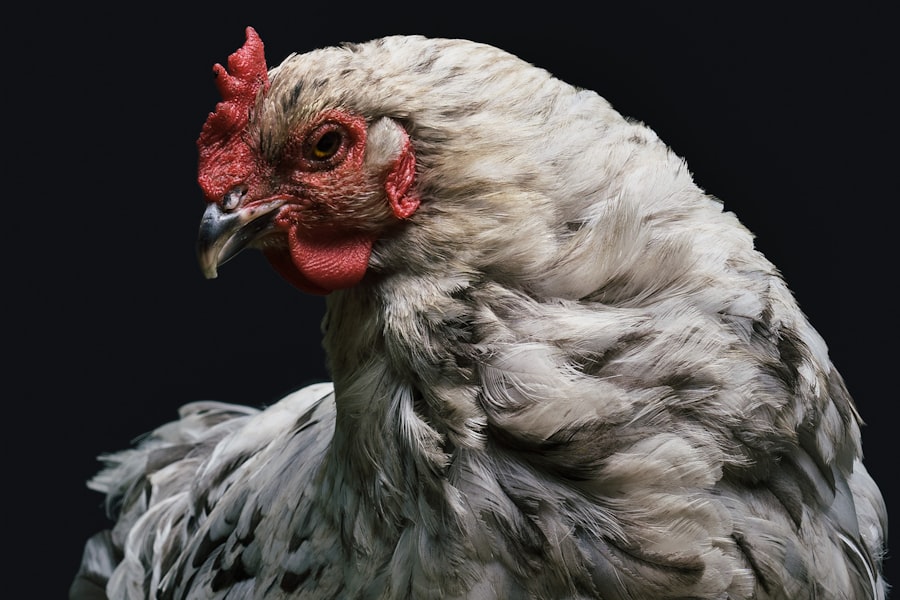Keeping chickens in your backyard can be a rewarding and fulfilling experience. Not only do they provide fresh eggs, but they also offer pest control and fertilizer for your garden. Personally, I have found great joy in raising chickens and have seen the many benefits they bring to my life. In this article, I will discuss the various benefits of raising chickens, how to choose the right breed for your backyard, tips for building the perfect chicken coop, essentials of chicken care, common chicken ailments and how to treat them, hatching and rearing baby chicks, understanding chicken behavior, using chicken manure and eggs in your garden, and provide a comprehensive list of the best books on keeping chickens and building chicken coops.
Key Takeaways
- Keeping chickens can bring joy and satisfaction to your life.
- Raising chickens can provide benefits such as fresh eggs, pest control, and fertilizer for your garden.
- Choosing the right breed of chicken for your backyard depends on factors such as climate, space, and egg production.
- Building a chicken coop requires careful planning and consideration of factors such as size, ventilation, and predator protection.
- Proper chicken care involves providing adequate food, water, and shelter, as well as monitoring for common ailments and diseases.
The Benefits of Raising Chickens
One of the main benefits of raising chickens is having a constant supply of fresh eggs. There is nothing quite like going out to your backyard every morning and collecting eggs that were laid by your own chickens. Not only are these eggs delicious and nutritious, but they also have a richer flavor compared to store-bought eggs. Additionally, you have control over what your chickens eat, so you can ensure that they are producing high-quality eggs.
Another benefit of keeping chickens is that they provide natural pest control. Chickens love to eat insects and other pests that may be lurking in your backyard. They will happily gobble up slugs, snails, ticks, and even small rodents. This can help reduce the need for chemical pesticides in your garden and create a more balanced ecosystem.
Furthermore, chickens produce high-quality fertilizer for your garden. Their manure is rich in nitrogen, phosphorus, and potassium, which are essential nutrients for plants. By composting their manure and adding it to your garden soil, you can improve its fertility and promote healthy plant growth. This is a sustainable way to nourish your plants without relying on synthetic fertilizers.
Choosing the Right Chicken Breed for Your Backyard
When it comes to choosing the right chicken breed for your backyard, it is important to consider your specific needs and environment. Some breeds are better suited for egg production, while others are more ornamental or have specific characteristics that make them suitable for certain climates. Popular chicken breeds include Rhode Island Reds, Leghorns, Sussex, and Plymouth Rocks.
Rhode Island Reds are known for their excellent egg-laying abilities and hardiness. They are a dual-purpose breed, meaning they can be raised for both meat and eggs. Leghorns, on the other hand, are known for their high egg production and are often used in commercial egg farms. They are a smaller breed and can be flighty, so they may not be the best choice if you have small children or live in an urban area.
Sussex chickens are a popular choice for backyard flocks due to their friendly and docile nature. They come in a variety of colors and are good layers of large brown eggs. Plymouth Rocks are another versatile breed that is known for their hardiness and ability to adapt to different climates. They are good layers of brown eggs and have a calm temperament.
Building the Perfect Chicken Coop: Tips and Tricks
Building a chicken coop is an essential part of keeping chickens in your backyard. It provides them with shelter, protection from predators, and a comfortable place to roost and lay eggs. When building a chicken coop, there are several factors to consider.
Firstly, you need to ensure that the coop is secure and predator-proof. This means using sturdy materials, such as hardware cloth, to cover windows and ventilation openings. You should also bury wire mesh around the perimeter of the coop to prevent predators from digging under.
Secondly, the coop should be well-ventilated to prevent moisture buildup and ammonia fumes from accumulating. This can be achieved by adding windows or vents that can be opened and closed as needed. Adequate ventilation is important for the health and well-being of your chickens.
Thirdly, the coop should have enough space for your chickens to move around comfortably. The general rule of thumb is to provide at least 4 square feet of space per chicken in the coop, and 10 square feet per chicken in the outdoor run. This will prevent overcrowding and reduce the risk of disease transmission.
Lastly, the coop should have nesting boxes for your chickens to lay their eggs. These boxes should be filled with clean bedding, such as straw or wood shavings, and placed in a quiet and secluded area of the coop. Providing nesting boxes will encourage your chickens to lay their eggs in a designated area, making it easier for you to collect them.
The Essentials of Chicken Care: Feeding, Watering, and Egg Collection
Feeding your chickens a balanced diet is essential for their health and egg production. A good quality chicken feed that is specifically formulated for laying hens should be the main component of their diet. This feed contains the necessary nutrients, such as protein, vitamins, and minerals, to support egg production and overall health.
In addition to chicken feed, you can also supplement their diet with kitchen scraps, fruits, vegetables, and grains. However, it is important to avoid feeding them anything that is toxic or harmful to chickens, such as avocado, chocolate, onions, or raw potatoes. Always research what foods are safe for chickens before offering them as treats.
Watering your chickens is also crucial for their health and well-being. Chickens need access to clean and fresh water at all times. You can provide water in a shallow dish or use a waterer specifically designed for chickens. Make sure to clean and refill the water container regularly to prevent the growth of bacteria.
Collecting eggs from your chickens is one of the most rewarding aspects of keeping them. It is important to collect eggs daily to prevent them from getting dirty or broken. You can use a basket or egg carton to collect and store the eggs. It is also a good idea to mark the date on each egg so that you can keep track of their freshness.
Health and Wellness: Common Chicken Ailments and How to Treat Them

Just like any other animal, chickens can get sick from time to time. It is important to be able to identify common chicken ailments and know how to treat them. Some common chicken ailments include respiratory infections, parasites, and egg-laying issues.
Respiratory infections in chickens can be caused by bacteria, viruses, or fungi. Symptoms may include coughing, sneezing, nasal discharge, and difficulty breathing. If you suspect that your chickens have a respiratory infection, it is important to isolate the affected birds and seek veterinary advice. Treatment may involve antibiotics or supportive care.
Parasites, such as mites and lice, can cause discomfort and health issues in chickens. Regularly inspecting your chickens for signs of parasites, such as feather loss, scabs, or redness, is important for early detection and treatment. There are various treatments available for parasites, including dusting powders, sprays, or oral medications.
Egg-laying issues can also occur in chickens. Some common problems include soft-shelled eggs, egg binding, or prolapsed oviducts. Providing a balanced diet with adequate calcium is important for preventing these issues. If you notice any abnormalities in your chicken’s egg-laying behavior or the quality of their eggs, it is best to consult with a veterinarian.
Preventing illness in your flock is always better than treating it. Good biosecurity practices, such as keeping a clean coop, providing fresh water and nutritious food, and regular health checks, can help prevent the spread of disease. It is also important to quarantine new chickens before introducing them to your existing flock to prevent the transmission of any potential diseases.
Raising Chicks: A Guide to Hatching and Rearing Baby Chickens
Raising baby chicks can be a fun and rewarding experience. To hatch baby chicks, you will need an incubator or a broody hen. Incubators provide a controlled environment for the eggs to develop and hatch, while broody hens naturally sit on the eggs and provide warmth and protection.
If using an incubator, it is important to follow the manufacturer’s instructions for temperature and humidity settings. The eggs should be turned several times a day to ensure proper development. After about 21 days, the chicks will start hatching. It is important to provide them with a warm and safe environment, such as a brooder box with a heat lamp, clean bedding, and fresh water.
If using a broody hen, she will take care of all the incubation and hatching process. You will need to provide her with a quiet and secluded area where she can safely raise her chicks. Make sure to provide her with food and water nearby so that she doesn’t have to leave the nest for long periods of time.
Rearing baby chicks involves providing them with proper nutrition, warmth, and socialization. They should be fed a chick starter feed that is high in protein and specifically formulated for their nutritional needs. The brooder box should be kept at a temperature of around 95 degrees Fahrenheit for the first week, gradually decreasing by 5 degrees each week until they are fully feathered.
It is important to handle the chicks gently and frequently to promote socialization and tame them. This will make them easier to handle as adults and help prevent aggressive behavior. Spending time with your chicks every day, talking to them softly, and offering treats can help build trust and create a bond.
Chicken Behavior: Understanding Your Flock’s Social Dynamics
Chickens are social animals that have a complex social hierarchy within their flock. Understanding their social dynamics can help you manage and promote a peaceful and happy flock. Chickens establish a pecking order, which is a hierarchical structure where each chicken knows its place in the flock.
The pecking order is established through pecking and other aggressive behaviors. The dominant chickens will assert their authority by pecking at the lower-ranking chickens. This behavior is normal and should not be a cause for concern as long as it does not become excessive or result in injury.
To promote a peaceful flock, it is important to provide enough space for your chickens to establish their own territories and avoid overcrowding. Overcrowding can lead to increased aggression and stress among the chickens. Providing multiple feeding and watering stations can also help reduce competition and aggression.
Introducing new chickens to an existing flock can be challenging, as it disrupts the established pecking order. It is best to introduce new chickens gradually and under supervision. This can be done by keeping them in separate enclosures within the same area, allowing them to see and interact with each other without physical contact. After a period of time, they can be gradually integrated into the main flock.
It is also important to provide enrichment activities for your chickens to prevent boredom and reduce aggression. This can include providing perches, dust bathing areas, and toys for them to peck at or play with. Enrichment activities help keep your chickens mentally stimulated and promote natural behaviors.
Sustainable Living: Using Chicken Manure and Eggs in Your Garden
One of the great benefits of keeping chickens is the sustainable living aspect it brings. Chicken manure is a valuable resource that can be used as fertilizer in your garden. It is rich in nitrogen, phosphorus, and potassium, which are essential nutrients for plant growth.
To use chicken manure in your garden, it is important to compost it first. Fresh chicken manure is high in ammonia and can burn plants if applied directly. Composting allows the manure to break down and become more stable, reducing the risk of burning plants and making the nutrients more readily available to plants.
To compost chicken manure, you can create a separate compost pile or bin specifically for it. Mix the manure with other organic materials, such as straw, leaves, or kitchen scraps, to create a balanced compost. Turn the compost regularly to ensure proper decomposition and aeration.
Once the compost is fully decomposed, it can be added to your garden soil as a natural fertilizer. Spread a layer of compost around your plants and gently work it into the soil. This will help improve soil fertility, structure, and water-holding capacity. It is important to avoid over-applying compost, as this can lead to nutrient imbalances or runoff into water sources.
In addition to using chicken manure in your garden, you can also use chicken eggs as a valuable resource. Eggs are not only delicious and nutritious for human consumption but can also be used in various ways in the garden. Crushed eggshells can be added to the soil to provide calcium and deter slugs and snails. Eggshells can also be used to start seedlings by filling them with potting soil and planting seeds directly into them.
The Best Books on Keeping Chickens and Building Chicken Coops: A Comprehensive List
If you are interested in keeping chickens or building a chicken coop, there are many great books available that can provide you with valuable information and guidance. Here is a comprehensive list of some of the best books on these topics:
1. “Storey’s Guide to Raising Chickens” by Gail Damerow: This comprehensive guide covers all aspects of raising chickens, from choosing the right breed to building a coop and caring for your flock.
2. “The Chicken Health Handbook” by Gail Damerow: This book is a valuable resource for identifying and treating common chicken ailments. It provides practical advice on maintaining the health and well-being of your flock.
3. “Building Chicken Coops For Dummies” by Todd Brock, David Zook, and Rob Ludlow: This book offers step-by-step instructions and plans for building various types of chicken coops. It covers everything from basic designs to more advanced structures.
4. “The Small-Scale Poultry Flock” by Harvey Ussery: This book focuses on raising chickens on a small scale and provides detailed information on natural and sustainable methods of poultry management.
5. “Chicken Coops: 45 Building Plans for Housing Your Flock” by Judy Pangman: This book features a variety of chicken coop designs, ranging from simple to elaborate. It includes detailed plans, photographs, and tips for building functional and attractive coops.
Keeping chickens in your backyard can be a rewarding and fulfilling experience. Not only do they provide fresh eggs, but they also offer pest control and fertilizer for your garden. By choosing the right breed, building a safe and comfortable coop, providing proper care, understanding their behavior, and utilizing their resources in a sustainable way, you can create a thriving flock that brings joy to your life. Consider keeping chickens in your own backyard and enjoy the many benefits they bring.
If you’re interested in learning more about keeping chickens, you’ll definitely want to check out this informative article on Poultry Wizard. It provides a comprehensive list of the best books about keeping chickens, offering valuable insights and tips for beginners and experienced chicken owners alike. One book that stands out is “Rent-a-Chicken Coop: A Practical Guide to Raising Chickens in Your Backyard.” This book not only covers the basics of chicken care but also explores the benefits of renting a chicken coop, making it a great resource for those looking to start their own backyard flock. For more information on this book and other recommended reads, be sure to visit Poultry Wizard’s article on the best books about keeping chickens.
FAQs
What are the best books about keeping chickens?
There are several great books about keeping chickens, including “Storey’s Guide to Raising Chickens” by Gail Damerow, “The Joy of Keeping Chickens” by Jennifer Megyesi, and “Chicken Health Handbook” by Gail Damerow.
What information can I expect to find in these books?
These books cover a wide range of topics related to keeping chickens, including choosing the right breed, building a coop, feeding and caring for chickens, and dealing with common health issues.
Are these books suitable for beginners?
Yes, these books are great for beginners who are just starting out with keeping chickens. They provide clear and concise information that is easy to understand.
Can I find these books online?
Yes, these books are available for purchase online through various retailers, including Amazon and Barnes & Noble.
Are there any other resources I can use to learn about keeping chickens?
Yes, there are many online resources available, including blogs, forums, and websites dedicated to raising chickens. You can also reach out to local farmers or poultry associations for advice and guidance.
Meet Walter, the feathered-friend fanatic of Florida! Nestled in the sunshine state, Walter struts through life with his feathered companions, clucking his way to happiness. With a coop that’s fancier than a five-star hotel, he’s the Don Juan of the chicken world. When he’s not teaching his hens to do the cha-cha, you’ll find him in a heated debate with his prized rooster, Sir Clucks-a-Lot. Walter’s poultry passion is no yolk; he’s the sunny-side-up guy you never knew you needed in your flock of friends!







